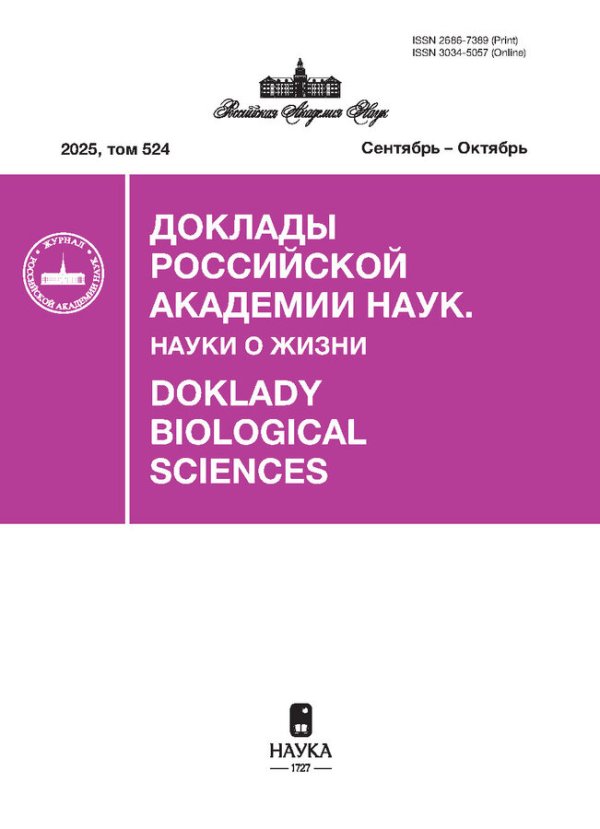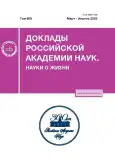EFFECT OF METHYL JASMONATE ON THE GENE EXPRESSION, ENCODING NON-PROTEIN THIOL ENZYMES IN WHEAT UNDER CADMIUM
- Authors: Repkina N.S.1, Titov A.F.1, Nilova I.A.1, Kaznina N.M.1
-
Affiliations:
- Institute of Biology of the Karelian Research Centre of the Russian Academy of Sciences
- Issue: Vol 509, No 1 (2023)
- Pages: 186-190
- Section: Articles
- URL: https://journals.rcsi.science/2686-7389/article/view/135654
- DOI: https://doi.org/10.31857/S268673892270010X
- EDN: https://elibrary.ru/NAZGUM
- ID: 135654
Cite item
Full Text
Abstract
The effect of the phytohormone – methyl jasmonate (MJ) on the expression of the TaGS1 and TaPCS1 genes encoding glutathione synthetase and phytochelatin synthase, respectively, which are key enzymes in the synthesis of glutathione and phytochelatins in wheat (var. Moskovskaya 39), was studied. For the first time, it has been shown, that pretreatment of plants by exogenous MJ (1 μM) leads to an increase in the accumulation of transcripts of the TaGS1 and TaPCS1 genes in leaves without cadmium effect. When cadmium (CdSO4, 100 μM) was added into the nutrient solution, the transcript level of TaGS1 gene increased in plants pretreated by MJ (compared to untreated plants), while the transcript level of TaPCS1 remained unaffected. The pretreatment of plants by MJ leads to a lower accumulation of cadmium in the roots and leaves of wheat. At the same time, MJ had no effect on the linear growth parameters of plants, but had a positive effect on the accumulation of biomass under cadmium. It has been suggested that MJ is involved in plant tolerance to cadmium by increasing the expression of the TaGS1 and TaPCS1 genes and, as a result, enhancing the synthesis of chelating compounds, as well as by reducing the supply of metal ions to plants.
About the authors
N. S. Repkina
Institute of Biology of the Karelian Research Centre of the Russian Academy of Sciences
Author for correspondence.
Email: nrt9@yandex.ru
Russian Federation, Petrozavodsk
A. F. Titov
Institute of Biology of the Karelian Research Centre of the Russian Academy of Sciences
Email: nrt9@yandex.ru
Russian Federation, Petrozavodsk
I. A. Nilova
Institute of Biology of the Karelian Research Centre of the Russian Academy of Sciences
Email: nrt9@yandex.ru
Russian Federation, Petrozavodsk
N. M. Kaznina
Institute of Biology of the Karelian Research Centre of the Russian Academy of Sciences
Email: nrt9@yandex.ru
Russian Federation, Petrozavodsk
References
- Zhai Q., Yan C., Li L. et al. Jasmonates. In: Hormone metabolism and signaling in plants // Amsterdam. Elsevier Ltd, 2017. P. 243–272.
- Kuznetsov Vl.V., Dmitrieva G.A. Physiology of Plants. Moscow: Unirite, 2016. (In Russ)
- Singh P., Arif Y., Siddiqui H. et al. Jasmonate: A versatile messenger in plants. In: Jasmonates and salicylates signaling in plants // Switzerland. Springer Nature, 2021. P. 129–158.
- Kolupaev Yu.E., Yastreb T.O. Jasmonate signaling and plant adaptation to abiotic stressors (Review) // Applied Biochemistry and Microbiology. 2021. V. 57. № 1. P. 1–19.
- Bali A.S., Sidhu G.P.S., Kumar V. et al. Mitigating cadmium toxicity in plants by phytohormone. In: Cadmium toxicity and tolerance in plants // Amsterdam. Elsevier Inc, 2019. P. 375–396.
- Chandrakar V., Yadu B., Xalxo R. et al. Mechanisms of plant adaptation and tolerance to metal/metalloid toxicity. In: Plant Ecophysiology and adaptation under climate change: Mechanisms and perspectives II Singapore // Springer Nature. 2020. P. 107–130.
- Raza A., Charagh S., Najati-Kakavand S. et al. The crucial role of jasmonates in enchancing heavy metals tolerance in plants. In: Jasmonates and salicylates signaling in plants // Switzerland. Springer Nature. 2021. P. 159–183.
- Singh I., Shah K. Exogenous application of methyl jasmonate lowers the effect of cadmium-induced oxidative injury in rice seedlings // Phytochemistry. 2014. V. 108. P. 57–66.
- Farhangi-Abriz S., Ghassemi-Golezani K. Jasmonates: Mechanisms and functions in abiotic stress tolerance of plants // Biocatalysis and agricultural biotechnology. 2019. V. 20. P. 101210.
- Nguen T.H., Goossens A., Lacchini E. Jasmonate: A hormone of primary importance for plant metabolism // Current Opinion in Plant Biology. 2022. V. 67. P. 102197.
- Napoleāo T.A., Soares G., Vital C.E. et al. Methyl jasmonate and salicylic acid are able to modify cell wall but only salicylic acid alters biomass digestibility in the model grass Brachypodium distachyon // Plant Science. 2017. V. 263. P. 46–54.
- Gallego S.M., Pena L.B., Barcia R.A. et al. Unravelling cadmium toxicity and tolerance in plants: Insight into regulatory mechanisms // Environmental and Experimental Botany. 2012. V. 83. P. 33–46.
Supplementary files











